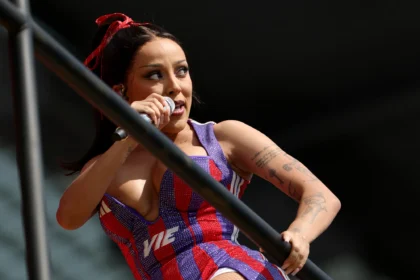Legendary producer Timbaland is facing intense criticism after a viral video accused him of repurposing a young producer’s beat through artificial intelligence—without consent.
The controversy began when footage surfaced showing Timbaland uploading a TikTok beat by rising producer KFresh into the Suno AI platform. The AI then generated a new version of the beat, complete with vocals from rapper C-Red, under Timbaland’s signature prompt “Baby Timbo.” Most notably, KFresh’s own producer tag remained intact, signaling the beat’s origin.
Accusations of Exploitation
Independent rapper and content creator Curtiss King took to X (formerly Twitter), calling out both Timbaland and Suno for what he described as a clear ethical violation. He argued that using someone’s beat—especially without removing their tag—goes far beyond remixing and veers into unauthorized exploitation.
“This is not sampling. This is AI theft,” King posted. “The original creator’s voice—his brand—is right there. No consent. No respect.”
KFresh responded in a follow-up video, pleading for accountability:
“Talk to me. You have a responsibility to us younger artists,” he said. “You can lead the way. It doesn’t have to be this broken system.”
Timbaland’s Response and AI Defense
Timbaland defended the move by labeling it a remix, claiming that Ghostface Killah had shown interest in the AI version and that the new track was meant as a creative reinterpretation—not a replacement.
Despite his history of supporting emerging producers, critics argue this situation marks a troubling precedent, especially given the lack of communication with KFresh prior to the AI transformation.
AI in Music: Innovation or Infringement?
The incident reignites a larger debate about the role of AI in hip-hop and music creation. While hip-hop has long embraced sampling and remix culture, many artists now argue that AI fundamentally changes the game—allowing major producers to sidestep permission, payment, and collaboration in favor of machine-generated artistry.
Even fellow producer Jermaine Dupri publicly criticized Timbaland’s use of AI, adding fuel to the growing divide among industry veterans.
Legal Heat for Suno
The situation also puts the spotlight back on Suno, the AI platform used in the track. Earlier this year, German rights agency GEMA sued Suno for alleged copyright infringement. The platform, alongside rival Udio, also faces ongoing lawsuits from major record labels for using copyrighted material in its training datasets.
Despite mounting scrutiny, Suno recently landed a deal with Amazon to enhance Alexa’s audio features. Timbaland remains a vocal partner in the platform’s development, even launching a virtual AI artist named TaTa.
What’s Next for AI and Artist Rights?
As AI continues to reshape music creation, this controversy underscores a critical question for the future of the industry:
Who truly owns a beat—its creator, its remixer, or its algorithm?
With power players like Timbaland driving AI experimentation, many fear that emerging artists could get left behind—or left uncredited—in the name of innovation.








